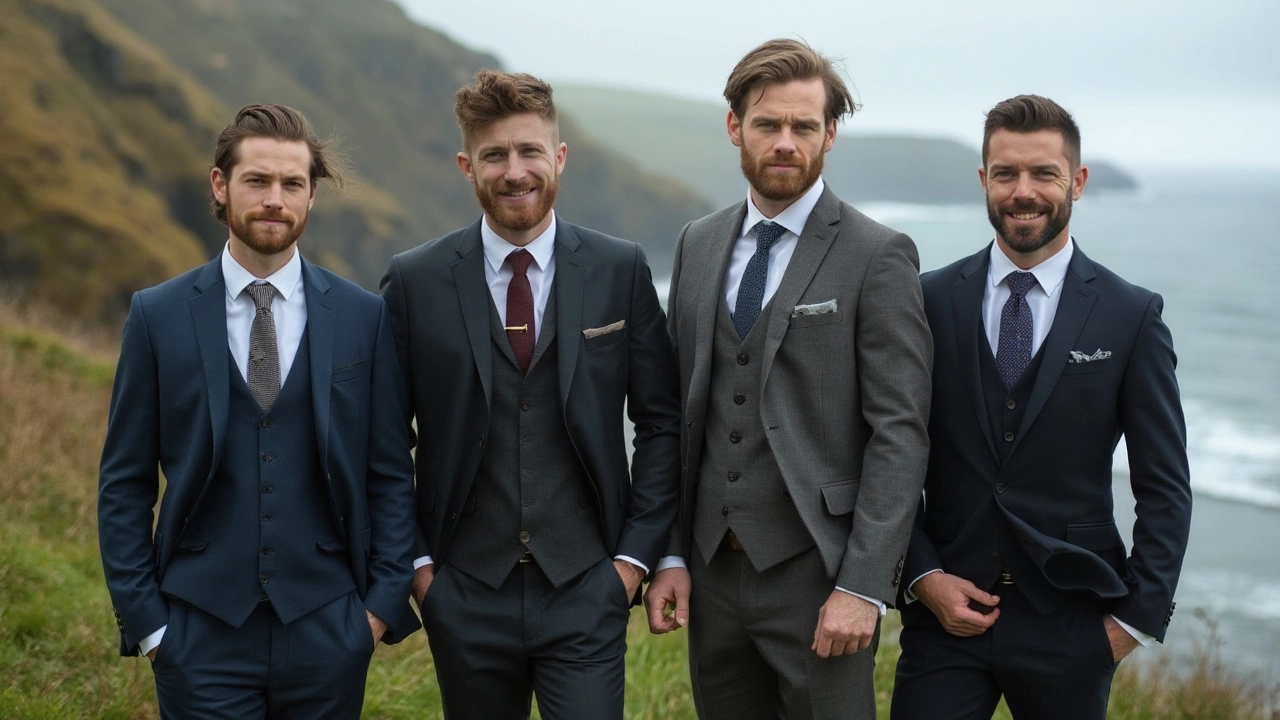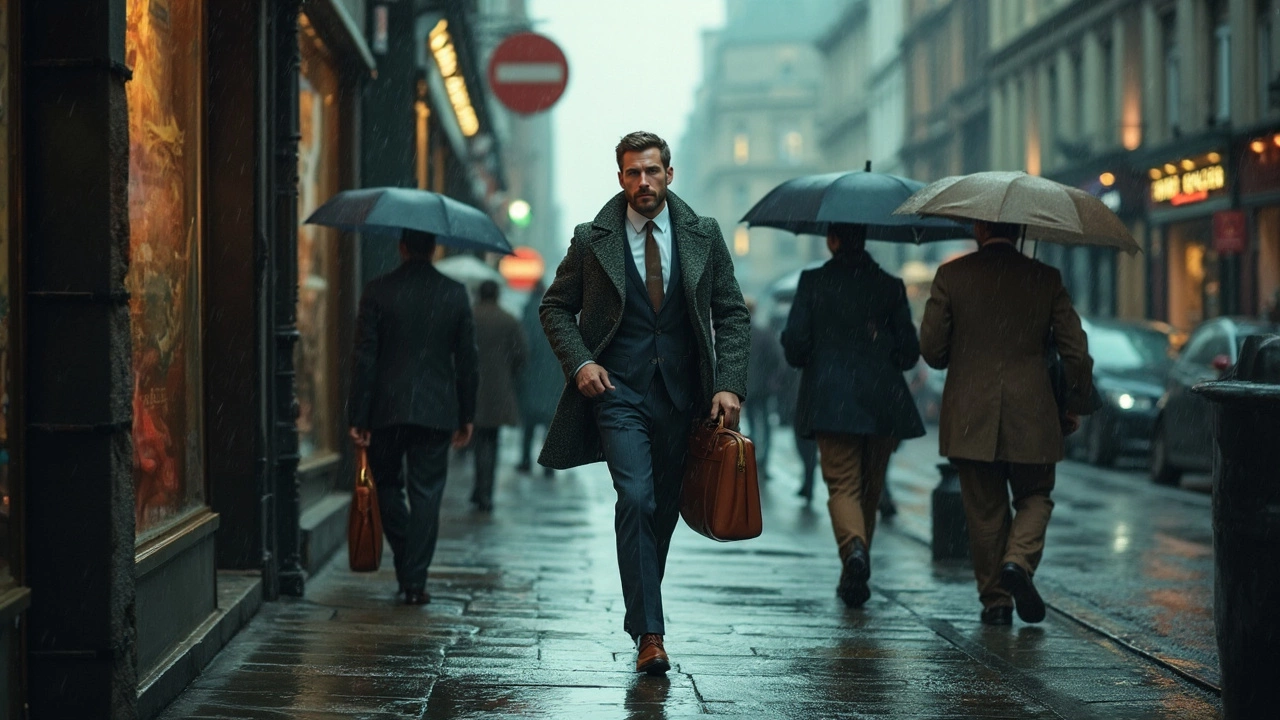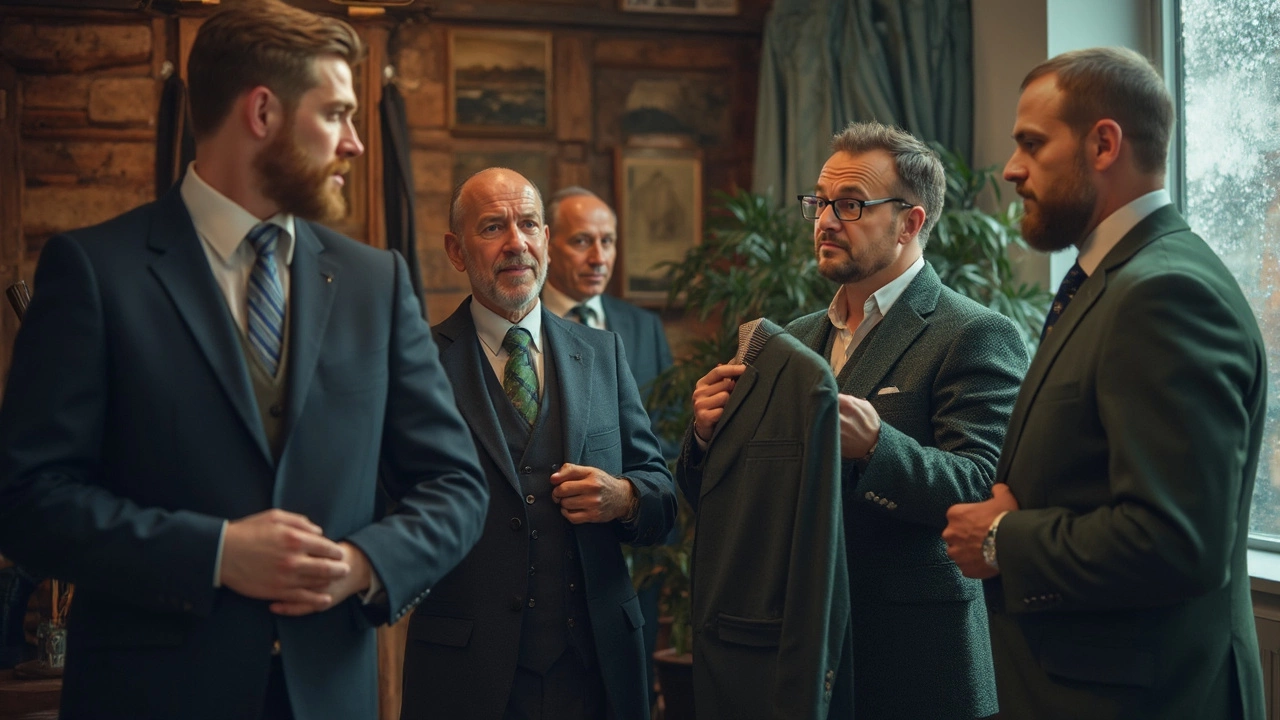Picking out suits in Ireland isn’t just about looking sharp—it’s about being ready for anything our unpredictable weather or social calendar throws your way. Whether it’s rain on the way to an interview in Galway or a sudden black-tie wedding in Kerry, it pays to have the right suit on hand. For lads in Ireland, ‘how many suits do I need?’ isn’t a one-size-fits-all question. Work, weddings, and even funerals all call for different looks.
So here’s the blunt truth: if you rely on suits for the office or travel a lot for work between Limerick and Belfast, you’ll need more than the guy who wears one suit to a cousin’s wedding in Sligo every couple of years. But that doesn’t mean breaking the bank. Want to know how you can cover all the bases, without a wardrobe stuffed full of barely-worn jackets? Let’s break it down.
- Why Every Irish Man Needs More Than One Suit
- The Core Suits: How Many Is Enough?
- Suit Styles and Fabrics for Irish Weather
- Local Brands, Tailoring, and Where to Shop
- Building a Flexible Wardrobe: Mixing, Matching, and Care
Why Every Irish Man Needs More Than One Suit
There’s a reason you’ll find more than one suit in nearly every Irish bloke’s wardrobe. For starters, life here doesn’t stick to just work and home—there are weddings in Killarney, christenings in Cork, and work interviews that always land during our most unpredictable weather. Having options just makes sense.
Most men in Ireland need at least two men's suits Ireland can throw at them: one for formal needs and another for everyday events. More than that, our funerals aren’t always planned, and showing up in something too flashy just won’t sit right. It’s about respecting tradition and looking like you’ve made an effort.
Dublin office culture—especially in finance, law, or tech—hasn’t totally dropped the suit either. Even if your day-to-day is smart-casual, last-minute meetings or presentations often require a full suit. And if you’ve ever been caught wearing Monday’s creased suit on a Thursday, you know the struggle. Rotating two or three suits helps them last longer too.
Beyond work, think about typical Irish occasions:
- Work events – Interviews, big meetings, retirements
- Family gatherings – Weddings, christenings, funerals
- Seasonal bashes – Christmas parties, New Year’s Eve, Galway Races
- Special invites – That friend who insists on a dress code for his 40th in Dublin
Not convinced? A quick look at a survey last year by Brown Thomas showed that over half their male suit buyers bought a second suit because they didn’t want to turn up in the same one to two family events in a row. And changing up just the tie and shirt sometimes won’t cut it—especially when there’s photographic proof on everyone’s phone.
| Event Type | Suit Needed |
|---|---|
| Job Interview | Navy or Charcoal Business Suit |
| Wedding | Classic Formal Suit (Blue, Grey, or Black) |
| Funeral | Dark Suit (Plain Black or Charcoal) |
| Family Gathering | Smart-Casual Suit |
Bottom line: even if you don’t live in a suit, you’ll get caught out if you only own one. Buying another doesn’t have to mean fancy. What matters is being ready for whatever Irish life brings—rain, shine, or the church bell on a windy day in Mayo.
The Core Suits: How Many Is Enough?
If you ask five Irish lads how many men's suits you need, you’ll get five different numbers. The sweet spot depends on your lifestyle, job, and how often you actually wear a suit. Here’s what works for most blokes in Ireland.
For lads working Monday to Friday in the office—like you see off Grand Canal Dock or Stephen’s Green—a good start is three solid suits. This gives you enough to rotate so you’re not caught out when one’s at the cleaners, and it also helps your suits last longer. For most office jobs in Ireland, navy and charcoal are the safest bets—they fit nearly every occasion, from business to more formal events like communion days. A third suit in a lighter grey or a bold check can double for less formal Fridays or summer dos.
- Navy Suit: The Irish classic. It goes everywhere—from job interviews at Allied Irish Banks to weddings at Powerscourt. Works all year round and looks clean even after public transport in the wet.
- Charcoal or Dark Grey Suit: Quiet enough for funerals, tidy enough for the boardroom, and formal enough for those no-nonsense family occasions.
- Lighter Grey or Patterned Suit: Perfect for interviews in less traditional workplaces, or a cousin’s wedding in Wexford during the summer. Adds a bit of personality without going mad.
If you’re not stuck in a suit every week, you can honestly get by with one sharp suit. Just make sure it fits well; think renting for rare black-tie affairs (It’s normal to see the same suit rented at Fitzgerald Menswear in Dublin or McKenna Man in Galway).
For lads in roles like law, finance, or sales, three suits is the absolute minimum. You don’t want to be spotted in the same jacket every major client meeting. Here’s an idea of the basics:
| Job Type | Recommended Number of Suits |
|---|---|
| Office/Corporate | 3–5 |
| Occasional Wear | 1–2 |
| Formal Professions (Solicitors, Bankers, etc.) | 5+ |
Would you rather mix it up? Invest in a couple of good blazers or separate trousers to stretch your options, and you’ll get more looks from fewer pieces—which is handy when you’re short on space in a city flat. Remember, in the Irish climate, durability is king. Fast fashion won’t survive the rain and regular outings, so it’s worth picking up suits from reliable Irish brands like Louis Copeland or Magee.

Suit Styles and Fabrics for Irish Weather
If you live on this island, you know the weather’s as reliable as a broken umbrella. That’s why picking men's suits Ireland loves is all about the right materials. Walking along the Liffey or waiting for a Luas in December, you’ll want something that can handle wind, rain, and cold without making you break a sweat.
Wool suits are an absolute winner. They’re warm, breathe well, and hold their shape, even after you’ve been caught in a shower between meetings. Look for mid-weight or worsted wool—these work most of the year except for the odd heatwave. Tweed is a classic Irish choice too, especially for autumn or winter. Not just for Donegal farmers, modern tweeds are softer and look sharp, whether you’re at a pub in Dingle or a boardroom in Cork.
If you’re only buying one or two suits in Ireland, avoid anything linen for daily wear. Sure, linen looks great at a June wedding in Kilkenny, but it wrinkles before you even sit down. Save it for special sunny days—those rare few.
For the fellas who run hot, try blended fabrics. A bit of polyester mixed with wool can make your suit lighter and faster to dry after a sudden drizzle. Just steer clear of full polyester suits. They don’t breathe, which is never good news if you’re running for the last bus out of Galway.
Here’s a quick look at some suit fabrics and when they work best in the Irish climate:
| Fabric | When to Wear | Pros | Cons |
|---|---|---|---|
| Wool | Year-round | Warm, breathable, long-lasting | Can be pricey |
| Tweed | Autumn/Winter | Insulates well, classic Irish style | Heavy for hot weather |
| Linen | Summer events | Cool, lightweight | Wrinkles easily, not rain friendly |
| Polyester blend | Spring/Autumn | Cheap, dries quick | Can look shiny, less breathable |
In terms of styles, two- and three-piece suits are both popular in the Irish market. A two-piece navy or charcoal is a solid bet for most work settings. Three-piece suits are making a comeback for big occasions, like weddings at Castle Leslie.
Look for suits with a half-canvas or full-canvas construction—these last longer and fit better over time, especially if you run into a Galway-level rainstorm. Single-breasted jackets with notch lapels are the standard in most Irish shops, from Louis Copeland in Dublin to Saville Menswear in Waterford.
Last tip: always check the lining. Bemberg or viscose linings feel better on your skin and stop you overheating when the sun finally decides to show up in Maynooth.
Local Brands, Tailoring, and Where to Shop
If you’re building up your men’s suits Ireland collection, you’ve got more options than you might think. Ireland’s got a few names that really stand out when you’re after something smart, well-fitting, and built for the climate.
Louis Copeland & Sons is legendary, especially around Dublin. These lads have been fitting Irish men since the 1930s, from presidents to rugby players. If you want a classic suit made to measure, this is the spot. They’ll ask about where you’ll wear it, what feels comfortable, and even sort your alterations quick if you’re in a hurry for an event.
For those who prefer shopping in Belfast, Remus Uomo has built a steady following. Their look is sharp but not too flashy, and they’re known for decent prices and a solid range of fits. Plus, you'll see their gear at suit-friendly events like graduations and GAA dinners.
Need something a bit friendlier on the pocket? Debenhams (still in the North) and Next stores across the island offer off-the-rack Irish fashion classics. You might not get the wildest variety, but you’ll get something that’ll do the job for work or a one-off event, with in-store tailoring to nip and tuck sleeves or trousers.
If you’re after real Irish fabric, don’t forget Magee 1866 from Donegal. Their donegal tweed suits are basically made for Irish weather—warm, tough, and still look great even if you get caught in a shower between pubs.
So where should you actually shop? Here are a few ways to make sure you walk out with a suit that’s right for you:
- Try on suits in person if possible. Sizing between brands can be all over the place and Irish weather often means you’ll want a bit of room for layers.
- Don’t skip alterations. Even a decent cheap suit can look expensive with a bit of tailoring from someone in your own town.
- Ask about fabric care—tweed, linen, and wool all behave differently if you sweat or get soaked.
- Expect to spend anywhere from €150 in chain stores to €700+ for a fully tailored suit at a top Dublin shop.
| Shop | Main Location | Price Range (€) | Tailoring? |
|---|---|---|---|
| Louis Copeland & Sons | Dublin, Cork, Galway | 600–1500+ | Yes (expert) |
| Remus Uomo | Belfast, web | 200–500 | Yes |
| Magee 1866 | Donegal, Dublin, online | 400–1200 | Yes (with fabric specialties) |
| Next, Debenhams (NI only) | Nationwide/Online | 120–350 | Yes (basic) |
Whether you buy local or from a chain, don’t overlook your local dry cleaner or tailor for keeping suits crisp and neat. And if you want help deciding where to try first, just ask a mate or the barman—odds are, he’s done the rounds before his own last big do.

Building a Flexible Wardrobe: Mixing, Matching, and Care
The real magic with men's suits in Ireland is getting the most bang for your buck—making a handful of suits stretch across lots of occasions. Having two or three smart suits is only the start. It’s what you do with them that makes a difference, especially with our changeable Irish weather where you might need a heavier wool jacket in January and something breathable for an August wedding.
If you’re smart about mixing and matching, you can double or even triple your looks without anyone noticing you’re wearing the same suit. For example, pair your navy blazer from one suit with the grey trousers from another. Even better, swap out shirts and ties—one crisp white shirt from Louis Copeland or Saville Menswear in Cork goes with literally anything and changes up the vibe in seconds. Same goes for shoes: brown brogues will head off to a wedding, while simple black Oxfords handle boardroom meetings in Dublin.
- Start with basics: Navy or grey suits work for almost everything. Charcoal is a safe bet, too, as you’ll blend right in at both city interviews and family gatherings in the West.
- Rotate pieces: Wear suit jackets as blazers with chinos at the office or a night out in Galway. Trousers from a suit can be dressed down with a jumper for more casual Fridays.
- Accessorise smartly: Change up your look with different ties, pocket squares, and even socks—think something fun from Irish brands like Irish Socksciety.
- Mind the fit: If your weight has changed or your suit feels off, most towns in Ireland have a good tailor. Dublin has a few gems like The Zip Yard, where you can tweak sleeves or adjust trousers for a perfect, modern fit.
- Layer for the climate: Lightweight suits from Magee are great for sudden sun and early rain. Their Donegal tweed is class for chilly evenings and has a proper Irish style.
Suit care can make your investment last for years. Never hang your jacket on a wire hanger—use a broad wooden one to keep the shoulders right. Most Irish dry cleaners offer pressing and cleaning, but don’t overdo it or you’ll flatten the fabric. Let your suit breathe between wears. If you cycle or walk a lot in cities like Dublin, hang your jacket once inside to air it out. Occasional steaming (even while you shower) does the trick for wrinkles.
| Suit Care Tip | How Often? |
|---|---|
| Dry clean | 1-2 times per season |
| Steam or press | After most wears |
| Rotate shoes | Daily, let them rest |
One last thing—get a decent waterproof suit bag if you’re travelling on Irish Rail or Bus Éireann. There’s nothing worse than an unexpected downpour messing up your threads before you even show up. Keep it practical and you’ll always look sorted, whether you’re in Cork, Killarney, or Dublin’s city centre.
